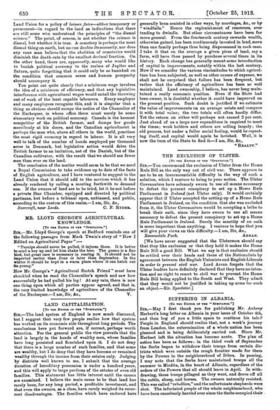LAND CAPITALISATION.
[To THE EDITOR OF THE "SPECTAT011."]
SIR,—The land system of England is now much discussed, but I suggest that very few people realize how that system has worked on its economic side throughout long periods. The conclusions here put forward are, if correct, perhaps worth attention. For the general public the view prevails that the land is largely in the hands of wealthy men, whose families have long persisted and flourished upon it. I do not deny that there is a large number of such families, and that some are wealthy, but I do deny that they have become or remained wealthy through the income from their estates only. Judging by districts well known to me, I submit that the average duration of hereditary possession is under a hundred years, and this will apply to large portions of the estates of even old families. This statement has little interest until the causes are examined. I believe the main cause to be that land has rarely been, for any long period, a profitable investment, and that even the owners, as a class, have rarely weighed its recur- rent disadvantages. The families which have endured have generally been assisted in other ways, by marriages, &e., or by " windfalls." Hence the replenishment of resources, ever tending to dwindle. But other circumstances have been far more general. From the fourteenth century onwards wealth, otherwise gained, has been continuously invested in land, more than one family perhaps thus being dispossessed in each case. I take it that on the average a given piece of land, say a farm, will have thus passed by purchase several times in its history. Each change has generally meant some introduction of capital in improvements, notably within the last century. Now if we consider the various viscissitudes to which agricul- ture has been subjected, as well as other causes of expense, we shall not be surprised that failure has been frequent, but rather that the efficiency of agriculture has been so well maintained. Land ownership, I believe, has never long main- tained a really economic position. Even if the State had been owner, it is doubtful whether it could have improved on the present position. Such doubt is justified if we estimate the valve of improvements on an average estate and compare it with total value; the two totals will often hardly differ. Yet the return on either will perhaps not exceed 2 per cent. Just ahead of us a large new expenditure is required to meet the times ; weak holders and others are selling largely; the old process, but under a fuller social feeling, would be repeat- ing itself, and capital would again be lavished. Well, it is now the turn of the State to find it.—I am, Sir, &c.,
" REALTY."














































 Previous page
Previous page